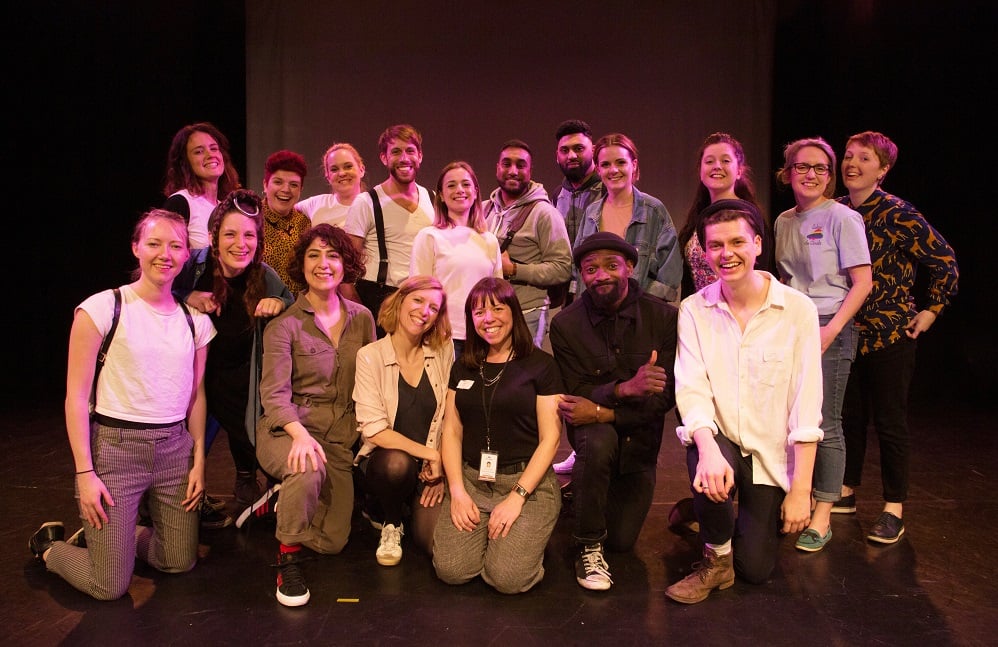
Participants in the Lowry's Artist Development Showcase
Supporting artists, not productions
Helping artists make new work is important, but building longer and deeper relationships with them brings greater rewards for all, says Claire Symonds.
Sometimes it seems there is barely time to breathe in this industry. We move quickly from one project to the next, hardly taking time to see what worked and what didn’t before we’re on to the next thing. But across ten years of artist development at The Lowry I’ve become convinced that we have to stop approaching artist development this way.
Relationships first
When I first arrived at The Lowry, our artist development programme concentrated on helping companies and artists to make a new piece of work. We offered funding, rehearsal space, technical support and a two-night run in our Aldridge Studio to get a piece of work on its feet. Then the show would leave the building and, often, so would our relationship with the artists making that show.
So I began to explore how we could change this. How could we make more of a difference to the artists we work with? What if we put the same level of investment into their professional development as their show budget? What if we committed to supporting the artists over and above any show they make?
I started to experiment with a new model of support that puts artists right at the centre of the conversation. Supporting them to make and premiere new work would always be important, but I decided to commit to fewer artists, offering them longer and deeper relationships based on a real commitment to working alongside them as they took a critical step forward in their practice.
Deep support
Our artist development programme now offers four main strands across theatre, dance and circus. ‘Artist Network’ is an open-access, drop-in programme of workshops and opportunities that anyone can access as they begin to build a relationship with us. ‘Class Of’ offers around 12 artists or companies a year-long programme of seminars, class trips and peer learning as they explore the business side of the industry and their place within it. ‘Developed With The Lowry’ is a highly bespoke, intensive 12-month package of production-focussed and professional development support at a key point in a career. And finally our ‘Associate Artist’ programme provides ongoing core funding and mentoring to help them develop national reach and profile. These strands operate independently but can also form a pathway to guide an artist through their career.
Offering deep support over a sustained period of time allows us to explore the questions that sit at the heart of these artists’ practices. We help them think beyond the project at hand to consider their longer-term ambitions and what making that work might mean. We supported our Associate Artists LUNG to create a verbatim production exploring the issues young carers face, working with our learning and engagement team, the charity Gaddum and four young carers from Salford. Through this, LUNG not only developed a best practice approach to working with communities and young people but also learned to navigate new contexts as we took the show to funders, young carers services and the Houses of Parliament. They are now able to take this learning into the other projects they are developing as they give voice to other underrepresented voices in society.
Being honest and building trust
We encourage artists to ask themselves big questions, but this doesn’t mean we believe The Lowry has all the answers. We walk alongside artists, offering support while they work out what is best for them and giving them the time and space they need to experiment, to veer off on tangents and come back with new insights.
Admitting we don’t always know the answer is a challenge for an organisation like The Lowry, because like most venues we want to be seen as expert in our field. However, being honest about this builds trust and challenges us to be more creative in our thinking. There are interesting and important lessons to be learned by taking the conventions of one artform and introducing them to artists in another. As a multi-artform venue, we can help artists explore different approaches and techniques, creating exciting opportunities for cross-fertilisation across the arts. After ten years and working with over 50 artists and companies, we can confidently say we know this approach works.
In it for the long-term
We can see the impact of our support in the work of artists and companies years later. But it also feels like a risk when so much of a venue’s success is judged on the number of artists they are seen to be supporting, rather than the depth of that support. We have benefited from some fantastic trusts and foundations and were delighted to get an uplift from Arts Council England for our artist development programme in the last National Portfolio investment round. However, the pressure to demonstrate reach over depth is something that is familiar to all of us. This pressure means as a sector we often feel the need to move on to the next exciting new prospect rather than giving long-term, sustained support to an artist as their career develops.
So this is a provocation. What might happen if we all slowed down a little? What if we saw a shift in the sector to give more artists the time to think, explore and grow within supportive venue environments? Real change takes time – maybe it is time for real change.
Claire Symonds is Senior Producer for Artist Development at The Lowry.
thelowry.com/artist-development
@The_Lowry
@claire_roses
This article is sponsored and contributed by The Lowry.
Join the Discussion
You must be logged in to post a comment.